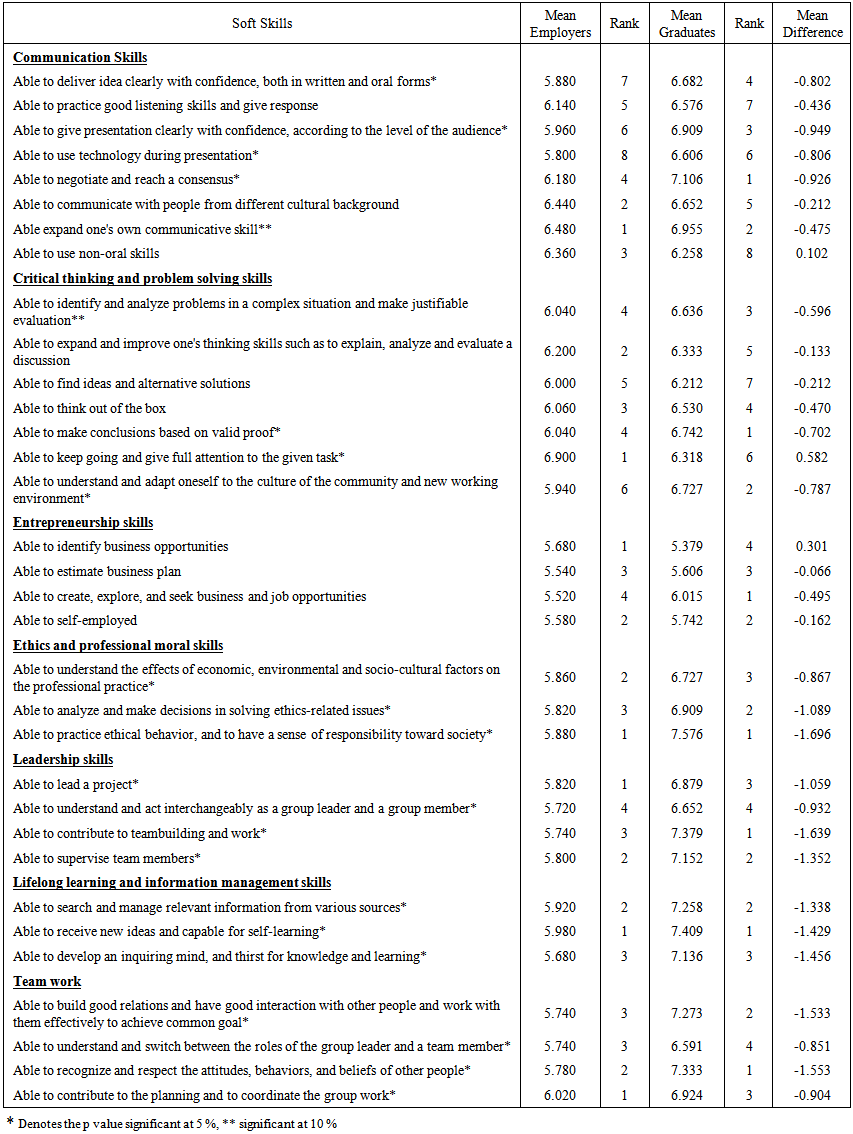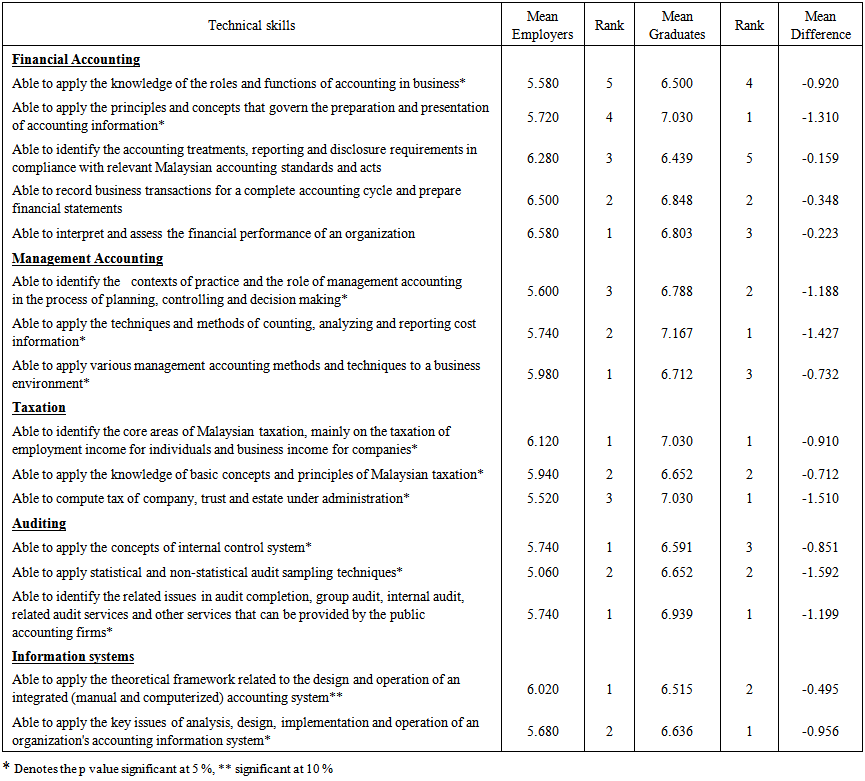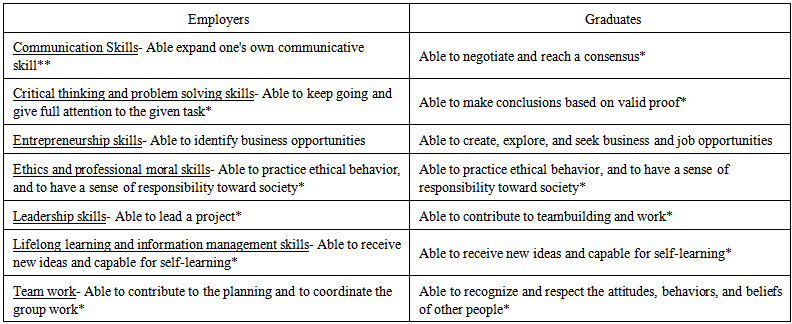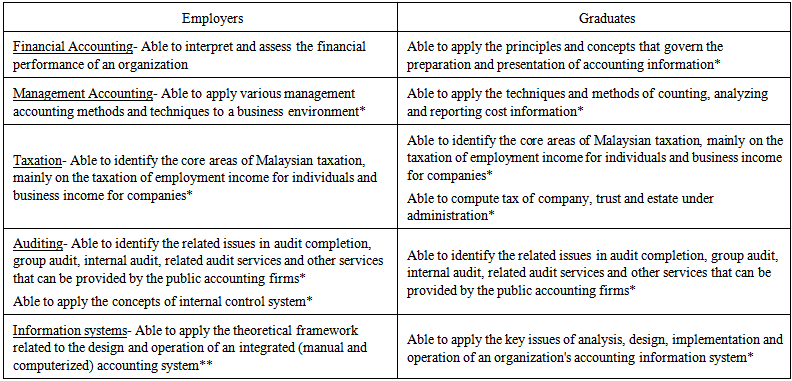-
Paper Information
- Next Paper
- Previous Paper
- Paper Submission
-
Journal Information
- About This Journal
- Editorial Board
- Current Issue
- Archive
- Author Guidelines
- Contact Us
American Journal of Economics
p-ISSN: 2166-4951 e-ISSN: 2166-496X
2015; 5(2): 98-104
doi:10.5923/c.economics.201501.09
Bridging the Gap of Perceived Skills between Employers and Accounting Graduates in Malaysia
Yee Ting Ngoo, Kui Ming Tiong, Wei Fong Pok
Faculty of Accountancy and Management, Universiti Tunku Abdul Rahman (UTAR)
Correspondence to: Yee Ting Ngoo, Faculty of Accountancy and Management, Universiti Tunku Abdul Rahman (UTAR).
| Email: |  |
Copyright © 2015 Scientific & Academic Publishing. All Rights Reserved.
The changing trend of market demand on the role of accountants in today competitive business environment raising the question on what skills is in the top priority of the current market needs in Malaysia. Particularly, Accounting graduates are less aware of the reality. This study aims to bridge the gap of perceived soft skills and technical skills between employers and Accounting graduates in Malaysia. Constant sum allocation method is adopted to analyze the relative importance of each of the attributes. Where each attribute of soft skills and technical skills are to be compared according to the rank assigned by employers and graduates. The results of the questionnaire survey show that employers demand a more independent and leadership type graduate instead of a follower. The findings provide better information in bridging the perceived skills gap between employers and graduates, the unemployed graduates a better understanding on the current market needs, and higher institutions to improve their curriculum in nurturing quality graduates.
Keywords: Perceived skills, Employers, Accounting Graduates, Malaysia
Cite this paper: Yee Ting Ngoo, Kui Ming Tiong, Wei Fong Pok, Bridging the Gap of Perceived Skills between Employers and Accounting Graduates in Malaysia, American Journal of Economics, Vol. 5 No. 2, 2015, pp. 98-104. doi: 10.5923/c.economics.201501.09.
Article Outline
1. Introduction
- Ministry of Education in Malaysia states the importance of quality human capital as the major pre-requisite for the sustainable development of the country. Universities are undeniably playing the main role in building such quality human capital. To date, there are 20 public universities or Public Institutions of Higher Education (PIHE), and 36 private universities or Private Institutions of Higher Education (PVIHE) in Malaysia (MOE, 2014a & 2014b). Among the programs offered in Business School, Accounting program never fail to come top as the most popular course with the highest number of enrollments. This is because Accounting program often perceived to be leading to the path of professionalism as accountant with job guarantee. However, to be an “accountant” in Malaysia, the membership of Malaysian Institute of Accountants (MIA) is required with conditions (Abdullah & Zakaria, 2006). When Accounting graduates enter the job market, most of them are unaware of the employment reality. They are either shocked or unprepared to adapt to the working environment or find it difficult to cope with their job responsibilities. This may due to the different perceptions between employers and graduates. In reality, graduates may excel in their soft skills while employers demand more on technical skills, and otherwise. Too high or too low emphasis on different skills not only created different expectations but also deepened the unnecessary gaps and misunderstandings. Whether the skills acquired in schools meet the current market needs is still questionable. The perceived importance of different skills between employers and graduates are yet to be identified. This study thus aims to bridge the gap between employers and Accounting graduates. Specifically, it is first to identify the perceived skills: soft skills, and technical skills of employers and graduates, second to identity the rank of the relative importance of each skills, and third to provide insights for curriculum development of Accounting programs in Malaysia. This study provides a better picture to not only Accounting graduates but also employers in Malaysia. A better view for graduates on what the current market needs, and employers on what soft skills, and technical skills that graduates expected to perform. Employers will be able to set expectations correctly and to avoid disappointments. The mutual understandings of both parties would then lessen the conflicts, and thus improve the productivity of graduates in the job market. In addition, this study also provides useful information for universities in designing better curriculum meeting the increasing demand of skills.
2. Literature Review
- The perceptions of employability have widely been studied in different fields. Such as in accounting (Paisey & Paisey, 2010), accounting information system (Theuri & Gunn, 1998), business (Jackson & Chapman, 2012), nursing (Roberts & Farrell, 2003), physiotherapy (Ramli, Nawawi & Maslyn, 2010), science and technology (Coll & Zegwaard, 2006), tourism (Chiru & Ciuchete, et al., 2012; Kelley Patterson & George, 2001), and in other fields. Apart from the different fields of study, studies have also been done from different perspectives ranging from the demand side to the supply side of the job market or both. The demand side referring the employers or practitioners, while the supply side referring the employees or graduates. Recently, studies to include academics or educators (Jones & Abraham, 2007). These past studies covering from the basic of knowledge skills, further to include soft skills, and technical skills.In addition to the knowledge skills, employers also demand good personality from graduates. The ability to adapt to the culture of the firm, and the desire to learn continuously also served as important factors to be considered (Cai, 2012; Bui & Porter, 2010). In the study of Gurcharan & Garib (2008), the results shown that graduates tend to rate themselves higher than what is perceived by the employers. However, same results shown in both groups in terms of ranking of employability skills according to its importance, from the most important of problem solving, and adaptability skills to the least important of communication skills. Additionally, in the qualitative study of Nikitina & Furuoka (2012), results shown that soft skills have more impact in bridging the gap of perceptions between employers and graduates, and proposed to include soft skills into the curriculum development in Public Universities.Nowadays, with the increasing important of information technology in the business environment, the role of accountant is not as simple. They are not only to prepare the financial statement, auditing and financial reporting, accountants also playing the role as information facilitators (Yasin, Bayes & Czuchry, 2005). Accountants thus need to learn new software program, make strategic decisions and adopt managerial role. These require management skills and information skills: organization behavior, strategic management, information system and more (Elliott & Jacobson, 2002). Technical skills are essential for the graduates to enter any job market, however, technical skills in any subjects like accounting or business are not sufficient for the graduates to perform and succeed. They need to improve their competencies in this fast changing environment (Deppe & Sonderegger, et al., 1991).In today competitive labor market, it is important to add value to students, knowledge skills alone leaving students less competitive. Graduates or students need to adapt the changing expectations of performance with broader skills besides capitalizing on their traditional technical skills (Howieson, 2003). Even though graduates nowadays are more aware of the need of soft skills especially on communication, analytical, professional and teamwork skills, the expectation of employers has also escalated from basic accounting skills to require graduates to have “business awareness” and sensitivity towards the current issues in the real world. Most of the employers prefer workers with life experience and work related skills (Jones & Sin, 2003). However, both students and employers reported that many of the Accounting programes in Universities failed to deliver both professional and non-technical skills (Kavanagh & Drennan, 2008). This is particularly true that universities play an important role to bridge the gap between the graduates and employers (Kelley Patterson & George, 2001).The valuable findings of this research could be adopted for the revision of syllabus in meeting the current needs of the job market. At such, to gain competitive advantage in the labor market, knowledge skills are to be complemented by soft skills. In view of the importance of skills, this study of skills to include not only the soft skills but also the technical skills. There are seven aspects of soft skills and five aspects of technical skills to be examined and described in the following.
3. Methodology and Samples
- The sampling is collected from survey covering 50 employers and 66 Accounting graduates. Graduates are selected from the universities recognized by Malaysian Institute of Accountants (MIA): Universiti Malaya (UM), Universiti Tunku Abdul Rahman (UTAR), and Univesiti SEGi, and employers are selected from Accounting firm, Audit firm, Taxation firm and other organizations with accounting related degree workforce. The survey questionnaires consist of two components: soft skills and technical skills. The first component of soft skills is adapted from the study of Nikitina & Furuoka (2012). These seven soft skills are communication skills, critical thinking and problem solving skills, entrepreneur skills, ethics and professional moral skills, leadership skills, lifelong learning and information management skills, and team work, while the second component of technical skills is recommended by the respective academics in Malaysia. These five technical skills include Financial Accounting, Management Accounting, Taxation, Auditing and Information Systems.Employers and graduates are required to evaluate and rate the importance of the soft skills and technical skills from 1 to 100%. The results are analyzed by constant sum allocation method that enables the measurement on the relative importance of each of the attributes. A mean table is provided to compare and to determine the gap between employers and Accounting graduates in Malaysia.
4. Results and Analysis
4.1. Soft Skills
- Among the seven soft skills attributes, graduates found to be overrated themselves in most of these skills (Table 1). Ethics and professional moral skills, and lifelong learning and information management skills are the skills with similar ranking from employers and graduates as the top most important attributes. In other words, no significant gap is found. These top ranking attributes are the ability to practice ethical behavior, and to have a sense of responsibility toward society, and the ability to receive new ideas and capable for self-learning.
 | Table 1. Relative Importance of Soft Skills between Employers and Graduates |
4.2. Technical Skills
- In technical skills (Table 2), no significant gap is found in Taxation and Auditing. The top priority is the ability to identify the core areas of Malaysian taxation, mainly on the taxation of employment income for individuals and business income for companies in Taxation, and the ability to identify the related issues in audit completion, group audit, internal audit, related audit services and other services that can be provided by the public accounting firms in Auditing for both employers and graduates. Additionally, in Auditing, employers also ranked the ability to apply the concepts of internal control system as top, while graduates as third. The largest gap of three levels different is found in Financial Accounting. Graduates ranked as top the ability to apply principles and concepts that governed the preparation and presentation of accounting information, while employers as forth. Employers demand for accounting graduates who can interpret and assess the financial performance of an organization but this ability is not significant as compared to graduates. In addition, the other significant attribute is ability to apply the knowledge of the roles and functions of accounting in business. However, this attribute is considered to be less important for both employers and graduates, where employer ranked as fifth, and graduates as forth.
 | Table 2. Relative Importance of Technical Skills between Employers and Graduates |
5. Discussion and Conclusions
- Accounting graduates in Malaysia often rate themselves higher than what is perceived by employers (Gurcharan, & Garib, 2008). They also over rated the importance of the skills as compare to employers’ perception either on soft skills or technical skills. Even though soft skills have higher impact in bridging the gap of perception (Nikitina & Furuoka, 2012), technical skills are equally important in the market of changing business environment. Among the seven soft skills, only entrepreneur skills are not significant and all of the soft skills are ranked differently except ethics and professional moral skills and lifelong learning and information management skills. In Table 3(a), employers demand a more independent and leader instead of a follower, and a more management prone graduates. Where employers demand a person who will be able to lead a project, keep going and give full attention to the given task, contribute to the planning and to coordinate the group work with the person’s own communicative skill (see the combination of the abilities from the skills). Accounting graduates, however, perceived themselves as a team player rather than a leader. To be a team player, graduates will need to recognize and respect the attitudes, behaviors, and beliefs of other people. They will make conclusions based on valid proof and negotiate to reach a consensus. No doubt all of the abilities under soft skills are important, but the differences in the priority widen the gap of perception for both employer and graduates. The gap between employers and graduates are mainly due to the misperception of the role of an accountant. Employers demand graduates who can perform more than the traditional accountant and thus the ranking on the importance of skills different from the graduates. Same results found in the study of Elliott & Jacobson (2002), where management skills and information skills are as important in meeting the needs of the changing accounting world.
 | Table 3(a). Summary of the Top Ranking of Soft skills for Employers and Graduates |
 | Table 3(b). Summary of the Top Ranking of Technical Skills for Employers and Graduates |
ACKNOWLEDGEMENTS
- We wish to acknowledge all the contributors from UTARRF (Universiti Tunku Abdul Rahman Research Fund) for funding this research.
 Abstract
Abstract Reference
Reference Full-Text PDF
Full-Text PDF Full-text HTML
Full-text HTML